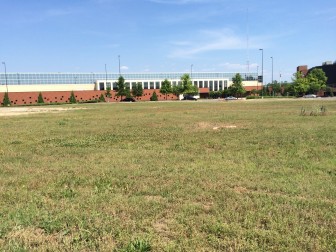Birmingham Revitalization: City Investments at Work in West Birmingham
Birmingham’s western business district is one of the city’s oldest. At one time, a thriving community of working- class families surrounded it. A shopping mall anchored the retail center, and businesses, large and small, lined Third Avenue West. Now, it’s a different story. The area has been in decline for decades. In 2011, the City of Birmingham spent $46 million on the Birmingham Crossplex sports facility in hopes of giving the area an economic boost.
Currently, 38 acres of grass and wildflowers sits adjacent to the Crossplex in the heart of Five Points West. This stretch of land was once the home of the State Fairgrounds and the Birmingham International Raceway. If the City of Birmingham has its wish, in a few years, this empty field will be the home of a hotel, an amphitheater and an array of stores and restaurants.
“It’s born primarily out of input from the residents, from the Five Points West area, where they have been very vocal about wanting restaurants, retail in the area,” explains Bob Nesbitt, developer for the Crossplex property. “They are now having to leave their community in order to take advantage of some of those services and they wanted those services in their area.”
The Crossplex draws hundreds of families to West Birmingham almost every week. With an annual economic impact of $100 million, surrounding stores and restaurants have seen a measurable uptick in sales. And if Birmingham and Nesbitt’s plan is successful, there will be even more traffic around the Crossplex. And residents will have access to jobs and more goods and services close to home.
Area Businesses Benefit from the Trossplex
Corey Bishop owns Refresh Clothing 2, a small sports clothing store across the street. He says after a bumpy start, the Crossplex is a positive influence for his business.
“The Crossplex has been both good and bad for us,” says Bishop. “The good part is there’s more people over here. But at first they didn’t allow kids to come into the stores. But now they’ve changed it and kids are allowed to come into the store, so we can see an increase in revenue that way.”
The Crossplex is one example of the city sponsoring the creation of a community asset while working with private enterprise to revitalize an area. Nesbitt says public investment helps in areas where private investors have cold feet.
Though not everyone thinks this “build it and they will come” philosophy will work.
“You can’t manufacture market interests. It has to be real,” says Brian Hilson, president and CEO of the Birmingham Business Alliance. He favors organic change, like in the Avondale neighborhood. There, Hilson says, private businesses slowly gravitated to an area for its growing and changing demographics and other business’ success.
“You can’t superimpose. You can to an extent, but it won’t be lasting,” he notes. “By creating a commercial development facility, you can to an extent dictate shoppers’ choices. But, over the long haul, you still have to have shoppers in the immediate area that causes them to want to want to spend their dollars there.”
Experts say economically depressed areas often experience a vicious cycle: Families leave due to lack of opportunities. Money isn’t invested because developers don’t think it’s profitable. No investment in the community makes more people leave. Fewer people, fewer investments.
The Need To Promote
“If you’re going to grow your city or area that’s economically challenged, you actually got to sell the area. You’ve got to sell the Crossplex,” says Sheila Tyson, a Birmingham city councilor for District 6, which includes sections of West Birmingham
Tyson says the dwindling investment cycle can be broken.
“You’ve got to make sure people know this is the place to be,” she says. “This is where you can make some money in this area, because if you don’t, no one wants to come anywhere where they can’t make money.”
Tyson says developers don’t overtly focus on or ignore one side of town over another. It all comes down to money, she says. Business people spend their money wherever they feel they will get the best return, and right now, those private investors aren’t looking to West and North Birmingham.
“I’m not going to say its racism, but I’m going to say there is a race factor, because the areas they not coming to build in is African American areas,” says Tyson. “The areas they are going in are the suburbs. So of course, a lot of this stuff is racially motivated. It’s about money. If we had the money to buy and desire to buy, they probably would build in our area.”
That’s why Tyson says direct investment by the city is vital to growth in all of Birmingham’s neighborhoods.
Hilson says it’s not that simple, and public money won’t solve many of the west side of Birmingham’s issues, mainly a perception of poverty and high crime. Still, he’s hopeful. Economic revitalization for western Birmingham is possible, Hilson says, even if has to be made neighborhood by neighborhood and often times, block by block.
This quiet epic is the top-grossing Japanese live action film of all time
The Oscar-nominated Kokuho tells a compelling story about friendship, the weight of history and the torturous road to becoming a star in Japan's Kabuki theater.
The Live Nation trial could reshape the music industry. Here’s what you need to know
On Tuesday opening statements will begin for the federal antitrust trial against Live Nation, one of the largest entertainment companies in the world.
A new one-a-day-pill holds promise for HIV’s ‘forgotten population’
It's designed to take the place of complicated, multiple drug regimens that many people with HIV need to follow. And it's also beneficial because the HIV virus is always evolving.
For filmmaker Chloé Zhao, creative life was never linear
Director Chloé Zhao used meditation, somatic exercises and dance to inspire the cast and crew of this Oscar-nominated story about William Shakespeare's family.
10 new books in March offer mental vacations
March is always a big one for books – this year is no different. We call out a handful of upcoming titles for readers to put on their radars — offering a good alternative to doomscrolling.
Sen. Chris Coons, D-Del., talks about the war with Iran and upcoming war powers vote
NPR's A Martínez asks Delaware Democrat Chris Coons, a member of the Senate Foreign Affairs Committee, about the war with Iran.







